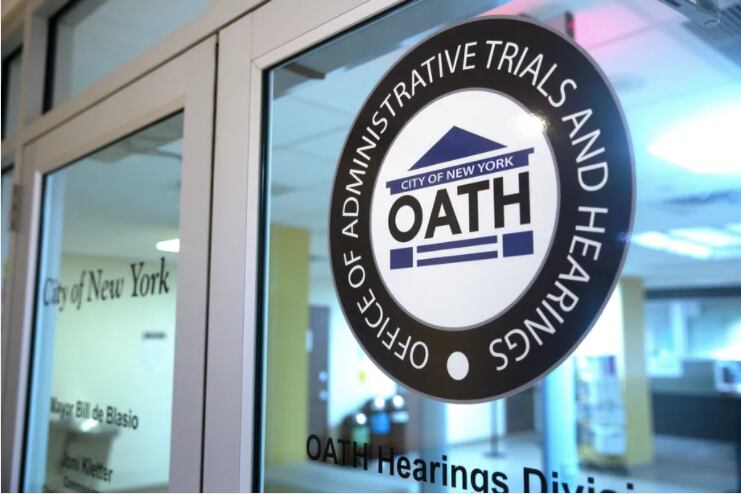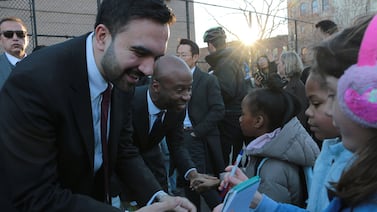This story was originally published on Dec. 22 by THE CITY.
The de Blasio administration is transferring oversight of a backlogged special education complaint system — where filings typically take months or years to resolve — from the education department to a city entity that operates administrative trials.
The shift was codified earlier this month in a memorandum of understanding between the city and state education departments and the Office of Administrative Trials and Hearings (OATH) that gives the city office two years to clear the case backlog.
OATH’s court-like system holds trials on alleged violations in a range of areas, including conflicts of interest rules, campaign finance regulations and local laws, such as the right to paid sick leave from work.
The move signals the apparent end of Mayor Bill de Blasio’s more than seven-year bid to reform the complaint system for families of special education students, just as he’s about to leave City Hall.
The filings are typically complaints by parents that their students aren’t getting required services, or requests by parents to make the city pay for private school tuition when the public schools can’t adequately serve their children.
The system saw about 5,000 due process filings annually when de Blasio first announced attempts at reform in June 2014. It now records more than twice that number per year — and is currently overrun with a backlog of more than 16,000 open cases, education officials confirmed earlier this month.
Family advocates said too many unanswered questions linger to let them gauge whether the move will bring improvements, even as they acknowledged that the current complaint system is broken.
”While rapid change without input from various stakeholders makes us a little uneasy, no action at all doesn’t make you feel good either,” said Matthew Lenaghan, deputy director of litigation at Advocates for Children.
City education officials said the shift marked a collective effort to help families of special education students who remain wary after past improvement plans failed to bring substantial change.
“This transition will allow us to significantly reduce wait times, ensure there are dozens of full-time dedicated hearing officers, and expand our tech capabilities to streamline the entire process,” said Sarah Casasnovas, a Department of Education spokesperson.
‘Adversarial process’
Dolores Swirin-Yao, of East Flatbush, Brooklyn, filed a complaint Sept. 25 seeking tuition reimbursement for her son, Jeremy, who’s 17.
Three months later, she’s still waiting for the case to be assigned to a hearing officer.
She’s been going through this process every year so that her son, who was diagnosed with dyslexia and ADHD, can continue studying at the private Aaron School in Manhattan.
Some years, education officials have offered Jeremy a spot in a public school, a placement Swirin-Yao and hearing officers haven’t considered appropriate. Some years, they haven’t.
But every year to date, the Department of Education has eventually settled and paid for the tuition.
“It would be great if his needs would be met in a public school,” said Swirin-Yao. “If they can’t be, then the whole adversarial process should get eliminated.”
A two-year clearance plan
The Dec. 1 agreement says OATH will initially hire as many as 50 full-time hearing officers to staff a newly created special education unit.
Once those hires are made, OATH and the current impartial hearing office at DOE will operate simultaneously for six months, at which point the system will fully transfer to the administrative trials office.
OATH will then be able to hire attorneys to serve as additional hearing officers. The memo directs OATH to clear the backlog in two years.
The state Education Department will retain responsibility for training hearing officers and, when necessary, decertifying them.
The document lays out an order of priority for scheduling hearings based on six types of complaints — with students entitled to but not receiving any special education services placed at the top.
Students missing some of the services mandated on their Individualized Education Programs come next, followed by students whose parents believe they’re entitled to more help than they’re getting.
The lowest priority is for parents who unilaterally place their children in private schools — as they’re allowed to do — on the belief that the public schools aren’t able to appropriately serve their kids’ needs.
‘Family-friendly approach’
The impartial hearing system has long been viewed by parents and advocates as needlessly combative — including under the prior administration of Mayor Mike Bloomberg.
Cases that are fought and won by parents one year are often relitigated by the DOE the next year — even when the circumstances underlying the claims haven’t changed.
The system has also been riddled with delays, which mean students go months without required special education services or parents wait months for reimbursement of significant amounts of money they spend on services or tuition.
De Blasio sought to address both issues shortly after arriving at City Hall when he announced changes to the handling of tuition reimbursements for parents who placed their children in private schools when public schools couldn’t appropriately serve them.
His solution included an expedited review of cases that could be settled within 15 days, along with faster payment of tuition.
“We believe in a parent-friendly, family-friendly approach, that we’re going to be able to come to a resolution quickly in the vast majority of cases, and help parents get what they need,” de Blasio vowed at the time.
Advocates say the idea was sound but it wasn’t fully implemented, and some critics even argued that its leniency encouraged more tuition reimbursement cases to be filed.
Between the 2014-15 and 2018-19 school years, complaint cases more than doubled to 9,695 a year, according to state education department data.
Additionally, the city’s spending on private school tuition for special education students has more than tripled under de Blasio — from under $200 million in fiscal 2013 to more than $650 million in fiscal 2021, according to the city’s Independent Budget Office.
No easy fixes
In February 2019, a state review of the city’s impartial hearing process for special education complaints found a system in “crisis” that was teetering on “collapse.”
Many of the problems identified were administrative in nature, including too few hearing officers, not enough hearing rooms and almost no mediation attempts by the Department of Education.
The city’s pay scale for the hearing officers was also criticized as too low, and not enough of them took on full caseloads — something the state eventually attempted to address by certifying more officers.
DOE officials at the time promised to invest $3.4 million to make physical improvements to the downtown Brooklyn hearing office, while reiterating their commitment to improving the complaint process for families.
In February 2020, parents mired in the complaints system filed a class action lawsuit over the city’s violation of a 75-day deadline for resolving cases. The average closure timeline at the time was 259 days.
Since then, state and city education officials have tried to introduce a number of solutions.
Last year, state officials required the city to mediate more cases. This year, they expanded the pool of attorneys eligible to serve as hearing officers, and allowed for some hearings by video to make hearings more accessible.
None of the measures made a dent, leading to this month’s agreement.






